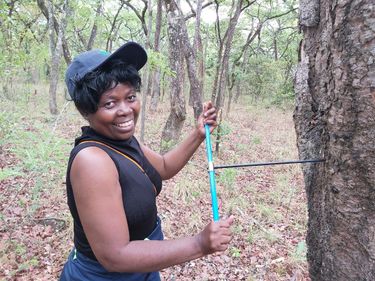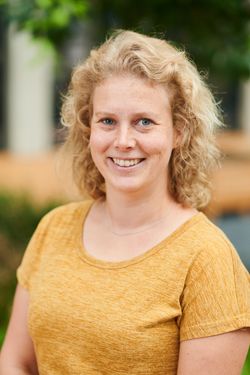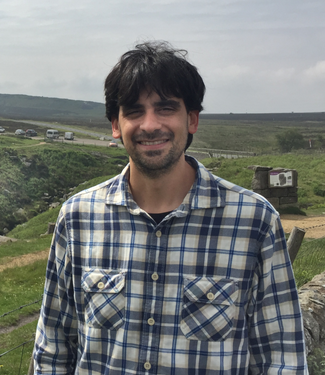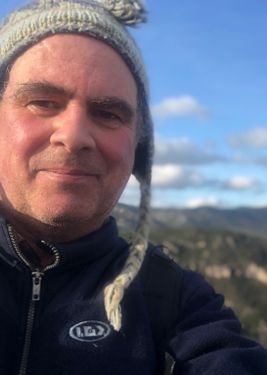
Trevor Porter
he/him
Sessions in which Trevor Porter participates
Tuesday 28 June, 2022
Wednesday 29 June, 2022
Session reescheduled from June 28th to June 29th
Thursday 30 June, 2022
In their book chapter in 2011 Gagen et al. (2011) highlighted the need for stable isotope dendroclimatology to move beyond studies that simply demonstrate ‘potential’. This symposium, more than a decade since this publication, will focus on dendrogeochemical studies that demonstrate that the field has moved beyond studies focused on ‘potential’. In particular, this session will strive to identify compelling new insights into unique aspect...
Neogene fossil beds in the Canadian Arctic Archipelago (CAA) provide a window into past greenhouse intervals and insights on what a future, warmer Arctic may look like. In this study, we use the hydrogen isotopes of lignin-methoxy groups (δ2HLM) from sub-fossil wood from six CAA sites (73-80°N) as a proxy for the δ2H of precipitation-derived plant water and paleotemperatures; five study sites cover Pliocene timeslices (~5.3-2.6 Ma) and the other site captures the middle Miocene (~15 Ma). F...
Sessions in which Trevor Porter attends
Monday 27 June, 2022
Free, in person and onlineWe will hold a practical, skills-based workshop introducing openDendro -- an open-source framework of the base analytic software tools used in dendrochronology in both the R and Python programming languages. openDendro is a new unified set of tree-ring analysis tools in open-source environments that provides the necessary baseline for dendro...
Meet colleagues and friends in an informal settingFree drinks for all!
Tuesday 28 June, 2022
Africa is faced with a number of challenges including climate change and ecological disturbance due to various anthropogenic activities. These problems adversely affect the forests and also ecosystem services. My appreciation for the forests motivated me to pursure my undergraduate studies in Forestry. I first applied dendrochronology during my PhD research which focused on understanding the climate change vulnerability of the Zambezi teak forests in Zambia. However, lack of research facil...
Wednesday 29 June, 2022
Dendrochronology is considered one the most precise of all the scientific dating techniques. However, it requires long sequences of tree rings and a master record for both the species and region in question. At the University of Groningen, we have been pioneering a new approach to dating that combines the precision of dendrochronology with the versatility of radiocarbon dating. It relies on the detection of spikes in the annual radiocarbon record, thought to b...
Fire-dependent red pine (Pinus resinosa Ait.) vegetation communities in the central Appalac...
Presentation of all Ameridendro2022 posters.FREE LUNCH FOR ALL ATTENDEES!
This is a mandatory (!) .... and FREE (!!) cocktail & award ceremony (!!!)(in replacement of the Banquet formula)->->->->->->->->->->->->->->->->->->After a great summer day of scientific and urban discoveries in our beloved MTL, we wish to bring together all the AmeriDendro community in one place and congratulate the TRS awardees for their remarkable achievements! -Bonsinsegna award-Fr...
Thursday 30 June, 2022
How old are tropical trees? This fundamental question has long driven the curiosity of laymen and scientists. But only recently, a great number of studies conducted by many brave dendrochronologists resulted in a significant tree-ring-based knowledge that allows us to start accurately estimating tree ages across the globe. As science goes, not only knowing the longevity of tropical trees is essential to understanding forest dynamics and its role in biogeochemical cycles, but one must also ...
A gap of millennial tree-ring data suitable for dendroclimatology has long been evident in the North American boreal forest. In my talk, I will describe the adaptive approach we have developed to build and improve a data network for millennial dendroclimatology in the eastern Canadian taiga. Recurrence of stand replacing wildfires is the most important constrain to the elaboration of long tree ring chronologies, which can only be developed away from regions ...
The interpretation of stable isotopes in a dendroecological framework can provide powerful insights into how trees adjust physiologically in response to the environment. This symposium aims to bring together researchers who use stable isotopes in tree rings to address ecophysiological responses to environmental changes from intra-annual to multi-decadal resolution. We hope this symposium will enable fruitful discussions and new ideas a...
Allies have emerged as key enablers of diversity and inclusivity initiatives in the workplace, in professional associations, and in everyday life. But what is an ally? What skills are required to be an effective ally? How do we hold ourselves and our community members accountable for being effective allies? This symposium will provide a deeper understanding of what it means to be an ally and the skills to help advance allyship as individuals and as a community. Fur...





